MENU
STIDS 2011 Home
About--
Topic list
Program Committee
Venue & Local info
Registration
Sponsors
Program--
Keynote Speakers
Tutorial
Agenda & Papers
Proceedings
Call for Papers
Important dates
Submission details
Download CFP
Attendees
C4I
Home

SEMANTIC
TECHNOLOGY FOR
INTELLIGENCE,
DEFENSE, AND
SECURITY
|
Leo Obrst |
Abstract: (parts 1 and 2)
The first two parts of the tutorial briefly introduce the core topics of Semantics, Ontologies, Logic, and the Semantic Web. It presents the essential concepts of formal semantic models and ontologies, ontologies and logic, and the Semantic Web languages (RDF/S, OWL, SWRL, RIF). The emphasis is on understanding the difference between syntax (and structure) and semantics, how this is applicable to computational modeling, how ontologies are semantic models, what ontologies are (vs. other semantic models such as taxonomies and thesauri), how logic supports ontologies, and how Semantic Web and other technologies provide languages and tools for representing these semantic models (ontologies and their instances, and potentially rules).
Short Bio:
Leo Obrst is principal artificial intelligence scientist at MITRE, advising the Information Semantics group he created in 2002. From 1999-2001, he was director of ontological engineering at VerticalNet.com, the first commercial ontology department, formed to create ontologies in the business-to-business electronic commerce market. Leo's PhD is in theoretical linguistics with a concentration in formal semantics from the University of Texas-Austin. He has worked over 27 years in computational linguistics, knowledge representation, and for the past 16 years in ontological engineering and more recently in Semantic Web technologies.
Leo is on the Executive Council of the International Association for Ontology and its Applications (IAOA), was a member of the W3C Web Ontology Working Group (OWL), co-founded the open community of practice Ontolog Forum in 2002, is a co-champion of the Open Ontology Repository (OOR) effort, co-organizer of the Ontology Summits (2006-2012), on the editorial board of the journal of Applied Ontology. He is the co-author of The Semantic Web: The Future of XML, Web Services, and Knowledge Management. John Wiley, Inc., June, 2003, and also a co-editor of Ontologies and Semantic Technologies for Intelligence, IOS Press, August, 2010. Leo has published many book chapters, conference and workshop papers, and reviews. He has chaired, organized, assisted on the program committees, or reviewed for over 70 conferences and workshops.
|
Kathryn Laskey |
Abstract: (part 3)
Techniques for making semantic information explicit and computationally accessible are key enablers for a wide variety of defense and intelligence problems. Most ontology languages have their logical basis in some fragment of first-order logic. As Sir Harold Jeffreys put it, "Traditional or deductive logic admits only three attitudes to any proposition: definite proof, disproof, or blank ignorance." The pervasiveness of uncertainty in the real world generates the necessity to draw conclusions and take action in circumstances on evidence that falls far short of proof or disproof. This part of the tutorial discusses how to combine semantic technology in a principled way with reasoning under uncertainty and learning from observation. A number of highly expressive probabilistic languages have been developed over the past two decades. These languages can be given a semantics that relates in a natural way to the semantics of traditional first-order logic. Such a logic naturally represents degrees of plausibility intermediate between proof and disproof, and supports evidential reasoning and learning from observation.
Short Bio:
Kathryn Blackmond Laskey, Ph.D., is Associate Professor of Systems Engineering and Operations Research at George Mason University and Associate Director of the Center of Excellence in Command, Control, Communications, Computing and Intelligence (C4I Center). She teaches and performs research on computational decision theory and evidential reasoning. Professor Laskey's research involves methods for representing knowledge in forms that can be processed by computers, extending traditional knowledge representation methods to represent uncertainty, eliciting knowledge from human experts, applying probability theory to draw conclusions from evidence arising from multiple sources. She is a leader in the application of Bayesian methods to automated support for multi-source fusion and situational awareness. She has developed methods for knowledge-based construction of problem-specific Bayesian belief networks, specifying Bayesian belief networks from a combination of expert knowledge and observations, and flexible adaptation of models to anomalous situations. She has applied her research to problems such as modeling the emplacement of improvised explosive devices, predicting aircraft delays, managing terrorist risk at public facilities, judicial reasoning, and planning military engagements. Professor Laskey developed multi-entity Bayesian networks (MEBN), a language and logic that combines the expressive power of classical first-order logic with the uncertainty handling capability of Bayesian inference. As an invited expert to the World Wide Web Consortium (W3C), Dr. Laskey co-chaired the Uncertainty Reasoning for the World Wide Web Experimental Group (URW3-XG), a group devoted to identifying aspects of uncertainty that need to be standardized for web-based applications. She is co-organizer of the Uncertainty Reasoning for the Semantic Web series of workshops at the International Semantic Web Conference, and the Semantic Technology for Defense, Intelligence and Security Conference. Professor Laskey was Program Chair in 1999 and General Chair in 2000 of the Conference on Uncertainty in Artificial Intelligence. She currently serves on the editorial board of the Journal of Artificial Intelligence Research. She served on a National Academy of Sciences committee to assess the statistical validity of the polygraph and has served on several boards and committees of the National Academy of Sciences.
|
Paulo C. G. Costa |
Abstract: (part4)
This last part of the tutorial is a hands-on demonstration of how to construct a probabilistic ontology from scratch and from an existing ontology. The Java-base, open source graphical probabilistic editor UnBBayes-MEBN will be used to illustrate the basic aspects of PR-OWL. PR-OWL is an OWL upper ontology for representing MTheories. Its classes and properties allow the ontology engineer to specify MFrags while maintaining compatibility with the widespread, W3C recommended OWL ontology language. As an ontology language, PR-OWL supports logical reasoning. Thus, PR-OWL ontologies can represent the knowledge needed for tasks such as inferring the class structure from the asserted properties.
Short Bio:
Paulo C. G. Costa, Ph.D is a Research Associate Professor at the GMU's C4I Center and an Affiliate Professor of the Systems Engineering and Operations Department at GMU. His research interests comprise the areas of probabilistic ontologies, decision support systems, systems design and integration, multi-sensor data fusion, probabilistic representation and reasoning, knowledge engineering, and Semantic Web languages. Prof. Costa teaches courses on decision theory, decision support systems design, and models for probabilistic reasoning. As a researcher, he became an expert in integrating semantic technology and uncertainty management, and is a pioneer in the field of probabilistic ontologies. Dr. Costa developed PR-OWL, a probabilistic ontology language for the Semantic Web, and was a key contributor to UnBBayes-MEBN, a Java-based, open source implementation of Multi-Entity Bayesian Networks and the PR-OWL language. His research path also includes work as a W3C invited expert in the area of uncertainty reasoning, and as a leading organizer of the Uncertainty Reasoning for the Semantic Web workshop series, which is now in its sixth edition. Prof. Costa has also acted as a program committee member in diverse academic fora, as an invited professor at the University of Brasilia, and at the Instituto Tecnológico da Aeronáutica (ITA - Brazil).
